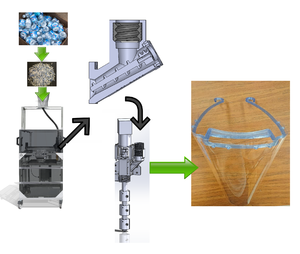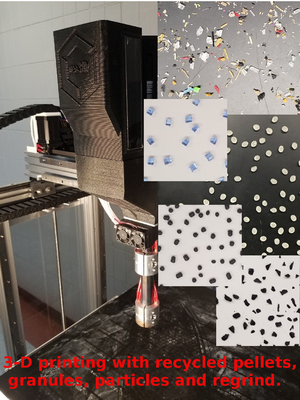Towards Distributed Recycling with Additive Manufacturing of PET Flake Feedstocks

This study explores the potential to reach a circular economy for post-consumer Recycled Polyethylene Terephthalate (rPET) packaging and bottles by using it as a Distributed Recycling for Additive Manufacturing (DRAM) feedstock. Specifically, for the first time, rPET water bottle flake is processed using only an open source toolchain with Fused Particle Fabrication (FPF) or Fused Granular Fabrication (FGF) processing rather than first converting it to filament. In this study, first the impact of granulation, sifting, and heating (and their sequential combination) is quantified on the shape and size distribution of the rPET flakes. Then 3D printing tests were performed on the rPET flake with two different feed systems: an external feeder and feed tube augmented with a motorized auger screw, and an extruder-mounted hopper that enables direct 3D printing. Two Gigabot X machines were used, each with the different feed systems, and one without and the latter with extended part cooling. 3D print settings were optimized based on thermal characterization, and both systems were shown to 3D print rPET directly from shredded water bottles. Mechanical testing showed the importance of isolating rPET from moisture and that geometry was important for uniform extrusion. The mechanical strength of 3D-printed parts with FPF and inconsistent flow is lower than optimized fused filament, but adequate for a wide range of applications. Future work is needed to improve consistency and enable water bottles to be used as a widespread DRAM feedstock.
- Cooling system, sifters, motorized auger crammer<ref>https://osf.io/q2bkd/<ref>* Just the code<ref>https://osf.io/fsjk9/<ref>* All source files for Gigabot X
- https://re3d.org/
- re3D on SketchFab
Keywords[edit | edit source]
polymers; recycling; waste plastic; upcycle; circular economy; PET; additive manufacturing; distributed recycling; 3D printing; open-source appropriate technology; [Circular economy]]; Polymer recycling; Sustainable development; distributed manufacturing; life cycle analysis; recycling; 3-D printing; Open source hardware; Open hardware; RepRap; Recycling; Polymers; Plastic; Recyclebot; Waste plastic; Composites; Polymer composites; Extruder; Upcycle; Materials science;additive manufacturing; waste plastic; extruder; upcycle ==Helen on re:3D's Material Testing==
For more advanced and faster printer optimization see: Finding Ideal Parameters for Recycled Material Fused Particle Fabrication-Based 3D Printing Using an Open Source Software Implementation of Particle Swarm Optimization
See also[edit source]
RepRapable Recyclebot and the Wild West of Recycling[edit source]
Recycling Technology[edit source]
- Recyclebot
- RepRapable Recyclebot: Open source 3-D printable extruder for converting plastic to 3-D printing filament
- Open Source 3-D Filament Diameter Sensor for Recycling, Winding and Additive Manufacturing Machines
- Improving recyclebot concepts
- 3-D Printable Polymer Pelletizer Chopper for Fused Granular Fabrication-Based Additive Manufacturing
- Mechanical Properties of Direct Waste Printing of Polylactic Acid with Universal Pellets Extruder: Comparison to Fused Filament Fabrication on Open-Source Desktop Three-Dimensional Printers
- Fused Particle Fabrication 3-D Printing: Recycled Materials' Optimization and Mechanical Properties
- Multi-material distributed recycling via material extrusion: recycled high density polyethylene and poly (ethylene terephthalate) mixture
- Mechanical Properties and Applications of Recycled Polycarbonate Particle Material Extrusion-Based Additive Manufacturing
- Wood Furniture Waste-Based Recycled 3-D Printing Filament
- Solar powered distributed customized manufacturing
- Mechanical Properties of Ultraviolet-Assisted Paste Extrusion and Postextrusion Ultraviolet-Curing of Three-Dimensional Printed Biocomposites
- Open Source Waste Plastic Granulator
- Open-Source Grinding Machine for Compression Screw Manufacturing
- Sustainability and Feasibility Assessment of Distributed E-Waste Recycling using Additive Manufacturing in a Bi-Continental Context
- Finding Ideal Parameters for Recycled Material Fused Particle Fabrication-Based 3D Printing Using an Open Source Software Implementation of Particle Swarm Optimization
- Waste Plastic Direct Extrusion Hangprinter
- Hangprinter for Large Scale Additive Manufacturing using Fused Particle Fabrication with Recycled Plastic and Continuous Feeding
- Open Source Cold and Hot Scientific Sheet Press for Investigating Polymer-Based Material Properties
- Low-Cost Open-Source Melt Flow Index System for Distributed Recycling and Additive Manufacturing
Distributed Recycling LCA[edit source]
- Tightening the loop on the circular economy: Coupled distributed recycling and manufacturing with recyclebot and RepRap 3-D printing
- Technical pathways for distributed recycling of polymer composites for distributed manufacturing: Windshield wiper blades
- Plastic recycling in additive manufacturing: A systematic literature review and opportunities for the circular economy
- Energy Payback Time of a Solar Photovoltaic Powered Waste Plastic Recyclebot System
- Life cycle analysis of distributed recycling of post-consumer high density polyethylene for 3-D printing filament
- Evaluation of Potential Fair Trade Standards for an Ethical 3-D Printing Filament
- Life cycle analysis of distributed polymer recycling
- Distributed recycling of post-consumer plastic waste in rural areas
- Ethical Filament Foundation
- Green Fab Lab Applications of Large-Area Waste Polymer-based Additive Manufacturing
- Systems Analysis for PET and Olefin Polymers in a Circular Economy
- Potential of distributed recycling from hybrid manufacturing of 3-D printing and injection molding of stamp sand and acrylonitrile styrene acrylate waste composite
- Towards Distributed Recycling with Additive Manufacturing of PET Flake Feedstocks
Literature Reviews[edit source]

- Waste plastic extruder: literature review
- Life cycle analysis of polymer recycling literature review
- Solar powered recyclebot literature review
- Waste plastic extruder: literature review
- Life cycle analysis of polymer recycling literature review
Externals[edit source]
- Economist article on U. of Washington's HDPE boat, Oprn3dp.me
- https://ultimaker.com/en/resources/52444-ocean-plastic-community-project
- Another possible solution - reusable containers [1]
- Commercial https://dyzedesign.com/pulsar-pellet-extruder/
- ---
- Cruz, F., Lanza, S., Boudaoud, H., Hoppe, S., & Camargo, M. Polymer Recycling and Additive Manufacturing in an Open Source context: Optimization of processes and methods. [2]
- Investigating Material Degradation through the Recycling of PLA in Additively Manufactured Parts
- Mohammed, M.I., Das, A., Gomez-Kervin, E., Wilson, D. and Gibson, I., EcoPrinting: Investigating the use of 100% recycled Acrylonitrile Butadiene Styrene (ABS) for Additive Manufacturing.
- Kariz, M., Sernek, M., Obućina, M. and Kuzman, M.K., 2017. Effect of wood content in FDM filament on properties of 3D printed parts. Materials Today Communications. [3]
- Kaynak, B., Spoerk, M., Shirole, A., Ziegler, W. and Sapkota, J., 2018. Polypropylene/Cellulose Composites for Material Extrusion Additive Manufacturing. Macromolecular Materials and Engineering, p.1800037. [4]
- O. Martikka et al., "Mechanical Properties of 3D-Printed Wood-Plastic Composites", Key Engineering Materials, Vol. 777, pp. 499-507, 2018 [5]
- Yang, T.C., 2018. Effect of Extrusion Temperature on the Physico-Mechanical Properties of Unidirectional Wood Fiber-Reinforced Polylactic Acid Composite (WFRPC) Components Using Fused Deposition Modeling. Polymers, 10(9), p.976. [6]
- Romani, A., Rognoli, V., & Levi, M. (2021). Design, Materials, and Extrusion-Based Additive Manufacturing in Circular Economy Contexts: From Waste to New Products. Sustainability, 13(13), 7269. https://www.mdpi.com/2071-1050/13/13/7269/pdf
- Papers
- Michigan
- USA
- Projects
- Devices
- MOST
- Polymer recycling
- MOST completed projects and publications
- 3D printing
- Recycling
- Rural community development
- Polymers
- Plastic
- Plastic bottles
- SDG09 Industry innovation and infrastructure
- 2020
- Sustainable development
- Distributed manufacturing
- Life cycle analysis
- Open source hardware
- Open hardware
- Recyclebot
- Materials science








